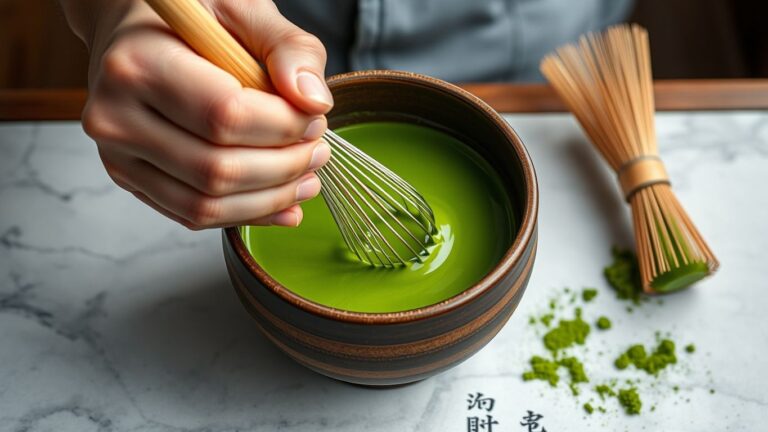Matcha, a finely ground powder made from specially grown green tea leaves, has gained popularity for its potential health benefits. For people with diabetes, matcha might offer some promising advantages. This article explores how matcha can be beneficial for diabetics, including its impact on blood sugar levels, weight management, and overall health.
Key Takeaways
- Matcha contains high levels of antioxidants, which can help reduce oxidative stress and inflammation, both of which are beneficial for managing diabetes.
- The EGCG in matcha can improve insulin sensitivity and help regulate blood sugar levels.
- Drinking matcha may support weight loss and reduce body fat, which is crucial for managing type 2 diabetes.
- Matcha has been shown to have a positive impact on heart health, reducing the risk of cardiovascular diseases that diabetics are more prone to.
- Incorporating matcha into a diabetic diet can be simple and effective, but it’s important to consult with healthcare professionals for personalized advice.
Understanding Matcha: What Makes It Unique?

Origins and Cultural Significance
Matcha, a powdered green tea, has deep roots in Japanese culture. It originated in China during the Tang Dynasty but was popularized in Japan by Zen Buddhist monks. They used it to enhance focus and calm during meditation. Today, matcha is a key part of the Japanese tea ceremony, known as Chado.
Nutritional Profile of Matcha
Matcha is packed with nutrients. Unlike regular green tea, where you discard the leaves, matcha uses the entire tea leaf. This means you get higher levels of caffeine, vitamins, and fiber. It’s also rich in antioxidants, particularly catechins, which help prevent cell damage.
How Matcha Differs from Regular Green Tea
While both matcha and green tea come from the Camellia sinensis plant, their processing sets them apart. Matcha leaves are grown in the shade, increasing their chlorophyll and amino acid content. After harvesting, the leaves are steamed, dried, and ground into a fine powder. In contrast, green tea leaves are grown in the sun and are quickly heated and dried after harvesting. This unique process gives matcha its vibrant green color and richer flavor.
The Science Behind Matcha and Diabetes
Key Compounds in Matcha
Matcha is packed with bioactive compounds, including polyphenols, catechins, and flavonoids. The most notable catechin is epigallocatechin-3-gallate (EGCG), which is highly concentrated in matcha. These compounds are believed to have a significant impact on blood sugar regulation and diabetes control.
How Matcha Affects Blood Sugar Levels
Matcha can help maintain optimal blood sugar levels, which is a boon for individuals managing diabetes. It works by inhibiting glucose absorption in the small intestine, reducing post-meal blood sugar spikes. This is particularly beneficial for diabetes management as it facilitates better blood sugar control following carbohydrate consumption.
Research Studies on Matcha and Diabetes
Emerging evidence suggests that matcha may play a role in managing blood sugar levels. Some studies indicate that the catechins in green tea, particularly EGCG, can improve insulin sensitivity and modulate glucose metabolism. A meta-analysis of 17 trials involving 1133 subjects revealed that green tea consumption significantly reduced fasting glucose and hemoglobin A1c (HbA1c) concentrations, indicating better long-term blood sugar control.
Blood Sugar Regulation with Matcha
Mechanisms of Blood Sugar Control
Matcha can help maintain optimal blood sugar levels, which is a boon for individuals managing diabetes. One way it does this is by reducing glucose absorption in the small intestine. This means that after you eat, your blood sugar won’t spike as much. Matcha also slows down the breakdown of complex carbohydrates into simple sugars, which helps keep your blood sugar stable.
Impact on Insulin Sensitivity
Insulin is a hormone that helps your body use glucose for energy. Sometimes, your cells don’t respond well to insulin, leading to high blood sugar levels. This is called insulin resistance. Matcha can improve insulin sensitivity, making your cells more responsive to insulin. This is especially beneficial for people with type 2 diabetes.
Role in Glucose Metabolism
Matcha may also help with glucose metabolism by inhibiting enzymes that break down carbohydrates into sugars. This slows down sugar absorption into the bloodstream, preventing sudden spikes. By doing so, matcha promotes better blood sugar control and helps in managing diabetes effectively.
Emerging evidence suggests that matcha may play a role in managing blood sugar levels. Some studies show promise regarding its ability to lower blood sugar levels and increase glucose absorption.
Antioxidant and Anti-inflammatory Benefits
Antioxidants in Matcha
Matcha is a potent source of antioxidants, which are crucial for protecting your cells from damage caused by free radicals. Antioxidants have been studied for their ability to improve glucose metabolism and insulin secretion. One key antioxidant in matcha is EGCG, which is particularly effective in reducing oxidative stress.
Reducing Oxidative Stress
Oxidative stress, caused by an excess of free radicals, can lead to various health issues, including insulin resistance and pancreas dysfunction. By incorporating matcha into your diet, you can help combat oxidative stress and improve your overall health. This is especially important for diabetics, as oxidative stress is often linked to insulin resistance.
Anti-inflammatory Properties
Chronic inflammation is associated with both type 1 and type 2 diabetes. Matcha contains anti-inflammatory properties that can help reduce this inflammation. EGCG in matcha is known to regulate inflammation, making it a beneficial addition to your diet. Reducing inflammation can improve insulin sensitivity and help manage diabetes more effectively.
Weight Management and Diabetes

Matcha’s Role in Weight Loss
Managing your weight is crucial when dealing with diabetes. Matcha green tea can be a helpful ally in this journey. Studies show that matcha can boost your metabolism and increase fat burning. This means your body can burn calories more efficiently, aiding in weight loss. One study even found that matcha increased the body’s rate of burning calories by 33%!
Impact on Body Fat and Waist Size
Belly fat is particularly harmful as it raises the risk of insulin resistance and type 2 diabetes. Drinking matcha may help target this stubborn fat. Research indicates that consuming matcha before exercising can help reduce abdominal fat specifically. This makes matcha a valuable addition to your weight management plan.
EGCG and Metabolism Boost
Matcha contains a powerful compound called EGCG (epigallocatechin gallate). EGCG is known for its ability to boost metabolism and enhance fat oxidation. This means it helps your body break down fat more effectively, contributing to weight loss and better overall health.
Living with obesity can be hard, but small steps like incorporating matcha into your diet can lead to big improvements in your health.
By adding matcha to your daily routine, you can support your weight management goals and improve your diabetes management.
Heart Health and Diabetes
Matcha’s Effect on Cholesterol Levels
Matcha can help lower bad cholesterol (LDL) and raise good cholesterol (HDL). This balance is crucial because diabetes often leads to heart and kidney disease, too. By improving cholesterol levels, matcha supports overall heart health.
Cardiovascular Benefits
Drinking matcha regularly can improve blood flow and reduce the risk of blood clots. These benefits are essential for people with diabetes, who are at a higher risk of heart disease. Matcha’s antioxidants help keep your blood vessels flexible and healthy.
Reducing Risk of Heart Disease
Incorporating matcha into your diet can lower your risk of heart disease. The antioxidants in matcha fight oxidative stress, which is a major factor in heart disease. By reducing oxidative stress, matcha helps protect your heart and overall health.
Kidney and Liver Protection
Preventing Kidney Disorders
Matcha tea is known for its potent antioxidant properties, which can help protect your kidneys. The antioxidants in matcha, such as catechins, can reduce oxidative stress and inflammation, which are common issues in kidney disorders. By drinking matcha, you may help your kidneys function better and reduce the risk of damage.
Liver Health Benefits
Drinking matcha may also support your liver health. Some studies suggest that matcha can lower your chances of liver disease and even liver cancer. However, it’s important to choose pure matcha over supplements, as some green tea extracts can cause liver damage. Stick to high-quality matcha to enjoy its liver-protective benefits.
Safe for Glucose Levels
For diabetics, it’s crucial to maintain stable blood sugar levels. Matcha can be a safe addition to your diet because it helps regulate glucose levels without causing spikes. This makes it a good choice for those looking to manage their diabetes while also protecting their kidneys and liver.
Optimal Matcha Consumption for Diabetics

Recommended Daily Intake
For managing diabetes, it’s generally recommended to consume 2-3 cups of matcha green tea daily. This amount can help regulate blood sugar levels and provide other health benefits. However, individual needs may vary, so it’s best to consult with your healthcare provider.
Best Practices for Consumption
To get the most out of your matcha, consider these tips:
- Choose high-quality matcha: Opt for organic Japanese ceremonial grade matcha for the best results.
- Avoid adding sugar: Sweeteners can spike blood sugar levels, counteracting matcha’s benefits.
- Pair with healthy foods: Combine matcha with foods like Greek yogurt, nuts, and seeds for a nutritious treat.
Potential Side Effects
While matcha is generally safe, consuming it in large amounts can lead to side effects such as:
- Insomnia: Due to its caffeine content, matcha can interfere with sleep if consumed late in the day.
- Digestive issues: Some people may experience stomach upset or constipation.
- Allergic reactions: Rarely, individuals may be allergic to matcha.
Always consult your healthcare provider before making significant changes to your diet, especially if you have underlying health conditions.
By following these guidelines, you can safely incorporate matcha into your daily routine and enjoy its numerous benefits.
Incorporating Matcha into a Diabetic Diet
Adding matcha to your diet can be a simple and effective way to help manage diabetes. Here are some tips on how to do it right.
Other Teas Beneficial for Diabetes
When it comes to managing diabetes, matcha isn’t the only tea that can help. There are several other teas that offer unique benefits for blood sugar control and overall health. Let’s explore some of these options.
Black Tea
Black tea is a popular choice and has been shown to have positive effects on blood sugar levels. Research suggests that black tea can improve insulin sensitivity and reduce blood glucose levels. It’s a great alternative to sugary drinks and can be enjoyed hot or cold.
Oolong Tea
Oolong tea is another excellent option for diabetics. This tea is partially fermented, giving it a unique flavor profile. Studies have indicated that oolong tea can help in reducing blood sugar levels and improving insulin resistance. It’s a flavorful way to support your diabetes management plan.
Herbal Teas
Herbal teas, such as chamomile, peppermint, and ginger tea, are also beneficial. These teas are naturally caffeine-free and can help in reducing inflammation and oxidative stress. Some research suggests that certain herbal teas may even lower inflammation levels, which is particularly beneficial for diabetics.
Incorporating a variety of teas into your diet can provide multiple health benefits and make managing diabetes a bit easier. Always consult with your healthcare professional before making any significant changes to your diet.
By exploring these tea options, you can find enjoyable ways to support your health and manage your diabetes effectively.
Matcha as Part of a Balanced Lifestyle

Incorporating matcha into your daily routine can be a delightful and healthful experience. This vibrant green tea powder offers numerous benefits, especially for those managing diabetes. Let’s explore how matcha can fit into a balanced lifestyle.
Combining Matcha with Exercise
Pairing matcha with regular exercise can enhance your overall well-being. The antioxidants in matcha may help reduce inflammation and improve recovery after workouts. Try having a cup of matcha tea before your exercise session for a natural energy boost.
Stress Reduction Techniques
Matcha contains L-theanine, an amino acid known for promoting relaxation without drowsiness. This can be particularly helpful in managing stress levels. Consider incorporating matcha into your mindfulness practices, such as meditation or yoga, to enhance your sense of calm.
Overall Dietary Recommendations
For a balanced diet, it’s essential to include a variety of nutrient-rich foods. Matcha can be a part of this by providing antioxidants and other beneficial compounds. You can add matcha to smoothies, oatmeal, or even salad dressings to make your meals more nutritious.
Remember, while matcha offers many health benefits, it’s important to consume it as part of a balanced diet and lifestyle. Always consult with healthcare professionals to ensure it fits your individual health needs.
Conclusion
In conclusion, matcha green tea offers a variety of benefits that can be particularly helpful for people managing diabetes. From its ability to help regulate blood sugar levels to its potential to improve insulin sensitivity, matcha stands out as a beneficial addition to a diabetic-friendly diet. Additionally, its rich antioxidant content and anti-inflammatory properties contribute to overall health and well-being. However, it’s important to remember that while matcha can support diabetes management, it should not replace any prescribed treatments or medications. Always consult with a healthcare provider before making any significant changes to your diet. By incorporating matcha into a balanced lifestyle, individuals with diabetes may find an enjoyable and healthful way to support their condition.
Frequently Asked Questions
What is matcha?
Matcha is a type of green tea that comes from Japan. It’s made by grinding green tea leaves into a fine powder. Unlike regular green tea, where you steep the leaves and then throw them away, with matcha, you drink the whole leaf.
How is matcha different from regular green tea?
Matcha is grown in the shade, which boosts its chlorophyll and antioxidant levels. When you drink matcha, you consume the entire leaf, making it more nutrient-rich than regular green tea.
Can matcha help manage diabetes?
Yes, matcha can help manage diabetes. It has compounds like EGCG that can help regulate blood sugar levels and improve insulin sensitivity.
How does matcha affect blood sugar levels?
Matcha can help keep blood sugar levels steady by slowing down the absorption of sugar in the intestines and improving how your body uses insulin.
Are there any studies supporting matcha’s benefits for diabetics?
Yes, several studies suggest that matcha can help manage diabetes by regulating blood sugar levels and improving insulin sensitivity. However, more research is needed to confirm these benefits.
How much matcha should diabetics drink daily?
It’s generally safe to drink 2-3 cups of matcha a day. However, it’s best to consult your healthcare provider for personalized advice.
What are the other health benefits of matcha?
Besides helping with diabetes, matcha is rich in antioxidants, can help with weight loss, and may improve heart health by lowering bad cholesterol levels.
Can matcha cause any side effects?
Matcha is generally safe, but drinking too much can lead to side effects like headaches, insomnia, and upset stomach. Always consult your doctor before making any changes to your diet.






